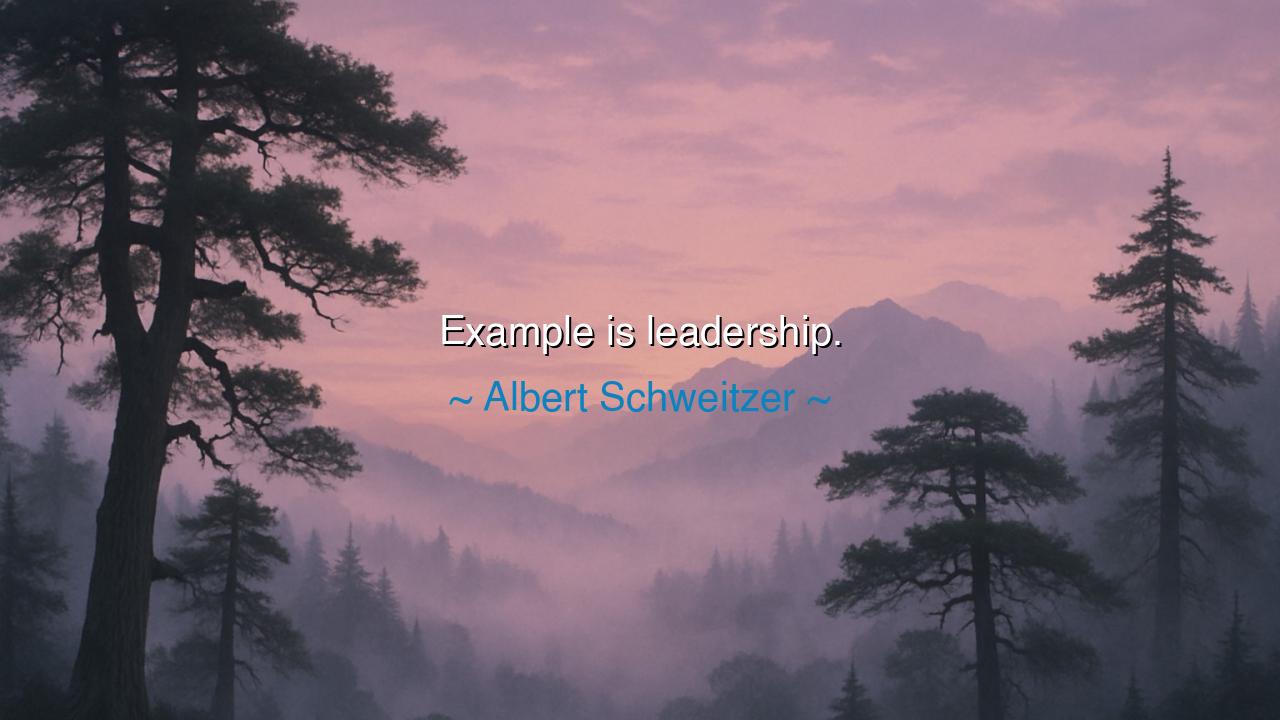
Example is leadership.






The words of Albert Schweitzer, “Example is leadership,” are simple in sound yet profound in meaning, carrying the weight of ancient wisdom and lived truth. In these few syllables, Schweitzer—doctor, philosopher, and servant of humanity—teaches that the essence of leadership is not command, nor title, nor power, but the life lived before the eyes of others. Deeds speak louder than decrees; character inspires more deeply than orders. The leader is not the one who shouts the loudest, but the one who shows the way by walking it himself.
The ancients echoed this wisdom long before Schweitzer gave it voice. Confucius declared that the ruler’s virtue was like the wind, and the people like the grass: when the wind blew, the grass would bend. In Rome, Marcus Aurelius reflected that a ruler’s first duty was to govern himself, for only then could he govern others. And even in the scriptures, it is written that a shepherd goes before his flock, not behind them, leading by example rather than driving by force. Thus Schweitzer’s words belong not only to his own age but to the eternal tradition of wisdom.
Consider Schweitzer’s own life. A man of brilliance who could have enjoyed a life of comfort in Europe as a theologian and musician, he instead chose to give his life in service as a physician in Africa. He did not merely write about compassion, he embodied it. He did not speak endlessly of sacrifice, he lived it with his hands, tending the sick and the poor. His example inspired thousands, not because of eloquence alone, but because his actions were the living proof of his words. That, in truth, was his leadership.
History offers countless witnesses to this principle. Mahatma Gandhi held no office, commanded no army, and yet he led millions. How? By living as he preached—walking barefoot, fasting, embracing simplicity, and refusing violence even when violence struck him. His example became his authority. People followed not because they were compelled, but because they saw a man who embodied the truth he asked of them. “Be the change you wish to see,” he urged, and in doing so, he showed that example is leadership.
The meaning is sharp and demanding: those who wish to lead must first live rightly themselves. A parent who demands honesty while living dishonestly is not a leader but a hypocrite. A commander who calls for courage while hiding from danger is not followed but despised. The leader’s true command comes from alignment between word and deed, between teaching and action. When people see that harmony, they follow willingly, for trust is born not from speeches but from example.
The lesson for us is clear. If we wish to lead—in our homes, in our work, in our communities—we must first ask, “What example am I giving?” Do not seek to change others by force; change yourself, and others will be drawn to follow. Show discipline if you want discipline, kindness if you want kindness, resilience if you want resilience. Each action becomes a seed planted in the hearts of those who watch, and in time, those seeds grow into forests of influence.
The practical action is this: live consciously, knowing that your life is always teaching. Choose daily habits that reflect the values you want others to embrace. Speak less of what should be done, and do more of it. Carry integrity like a banner, for it is the silent sermon that reaches deeper than words. By living your ideals, you become a leader regardless of title, position, or recognition.
Therefore, O listener, remember Schweitzer’s eternal truth: “Example is leadership.” Strive not for power, but for consistency of life. Strive not for glory, but for authenticity of action. For when your deeds shine brighter than your words, you will lead not by command but by inspiration, and that is the leadership that endures across generations.






AAdministratorAdministrator
Welcome, honored guests. Please leave a comment, we will respond soon